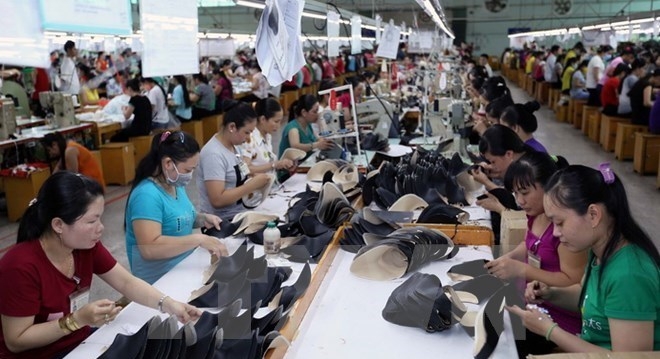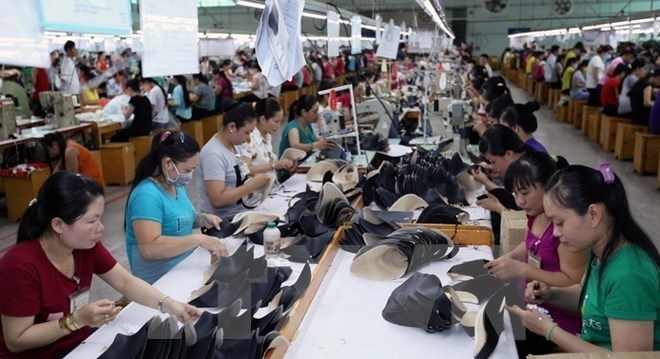
According to the Vietnam Leather, Footwear and Handbag Association (Lefaso), the country’s leather industry is enjoying good chances to benefit from the shift of orders from China as a result of the tendency of moving to the production of high-tech goods.

Illustrative image (Photo: VNA)
Industry sources also said the signing of a number of trade
agreements like the Vietnam
– EU Free Trade Agreement (EVFTA) and the Comprehensive and Progressive
Agreement for Trans-Pacific Partnership (CPTPP) is ushering in chances of
development for Vietnam,
especially in attracting investment and boosting export to the markets in the
EU and CPTPP members.
Lefaso president Nguyen Duc Thuan
affirmed that export activities of Vietnam’s leather industry are
seeing a stable growth with positive signs for the second half of this year and
the years to come. The forecast for the world economy in 2018 is rosy, that is
why the demand in Vietnam’s
major export markets like the US,
the EU, China, Japan and the Republic of Korea
will be better than that in 2017.
China is believed to continue the policy of
reducing investment incentives in the industries of garment and leather to
focus on high-tech ones, and orders for footwear and handbags is expected to
keep moving from China to Vietnam in
anticipation of chances created by those FTAs. However, Vietnam’s
leather industry is now facing numerous difficulties like rising labor costs
and low productivity compared to other countries in the region. Especially, the
Fourth Industrial Revolution will also cause impact on the enterprises in the
industry as they will head to investing in modern machinery and reducing work
hands.
The leather industry’s production is
planned to turn out about 279 million pairs of footwear in this year, with 72
million pairs in the third quarter and 80 million pairs in the last.
The first half of this year continued to witness
a growth in the production by the industry, with 127.4 million pairs produced,
an increase of 5.1% year-on-year. They brought back US$9.45 billion to the
country, rising by 8.4% compared to the same period last year. The export
revenue of this kind of product is forecast to reach US$19.5 billion, or 10%
higher than the figure recorded in 2017.
Source: NDO
According to data from the Hoa Binh Provincial Party Committee, the industrial production index for the first six months of 2025 is estimated to have increased by 20% compared to the same period last year. This marks the highest year-on-year growth rate for this period since 2020.
In the first six months of 2025, Hoa Binh province’s export turnover was estimated at 1.145 billion USD, marking an 18.11% increase compared to the same period in 2024. Import turnover was estimated at $ 804 million, a 17.15% increase, which helped the province maintain a positive trade balance.
The lives of the ethnic minority farmers in Tan Lac district have gradually improved thanks to the new directions in agricultural production. This is a testament to the collective strength fostered through the professional associations and groups implemented by various levels of the district’s Farmers’ Union.
With the motto the "product quality comes first,” after nearly one year of establishment and operation, Muong village’s Clean Food Agricultural and Commercial Cooperative, located in Cau Hamlet, Hung Son Commune (Kim Boi district), has launched reputable, high-quality agricultural products to the market that are well-received by consumers. The products such as Muong village’s pork sausage, salt-cured chicken, and salt-cured pork hocks have gradually carved out a place in the market and they are on the path to obtaining the OCOP certification.
In the past, the phrase "bumper harvest, rock-bottom prices" was a familiar refrain for Vietnamese farmers engaged in fragmented, small-scale agriculture. But today, a new spirit is emerging across rural areas of Hoa Binh province - one of collaboration, organisation, and collective economic models that provide a stable foundation for production.
Maintaining growing area codes and packing facility codes in accordance with regulations is a mandatory requirement for agricultural products to be eligible for export. Recently, the Department of Agriculture and Environment of Hoa Binh province has intensified technical supervision of designated farming areas and packing facilities to safeguard the "green passport" that enables its products to access international markets.



